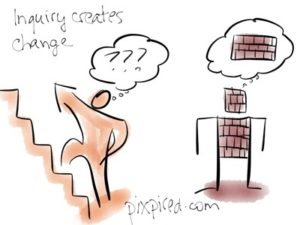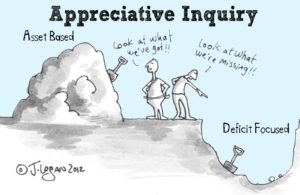Making Appreciative Inquiry work – using the questions

In the final post in our series on Appreciative Inquiry, using another case study we’ll give you some more hints about how to use the questions. Do get in touch if you need our facilitation services to guide you through, and let us know about your experiences of this method in the comments section below.
I’ll illustrate how to use the questions with a project I was involved in with Age Concern London to celebrate the millennium. This involved students talking to older people to bring out the best of their experience of living in London, as well as to highlight the problems older people faced and the aspects that required change.
The questions included:
- What’s the best thing about being the person you are now?
- How could society better benefit from you?
- What changes will your life go through in the next 5 – 10 years and what help will you need to deal with these changes?
This is the advice that we gave the students:
 1. Ask people to be specific. If people say, ‘bring in bright young intelligent people’ or ‘revive civic pride’, ask how. If they say ‘People need to feel they are not helpless’, ask ‘What can achieve this?’.
1. Ask people to be specific. If people say, ‘bring in bright young intelligent people’ or ‘revive civic pride’, ask how. If they say ‘People need to feel they are not helpless’, ask ‘What can achieve this?’.
2. Ask people for a story. This is a homeless Londoner answering a question about when good things have happened: ‘One Christmas Eve waiters from a banquet in the South Bank brought large turkeys and trifles on silver salvers to the Bull Ring. That was a great day!’
3. Encourage people to be positive. If someone says, ‘I want less anti-social behaviour’, turn it round and ask them what that means they want more of.
It does take a while for people to get to grips with the appreciative aspect. The older people said, “We’re leaving out 50% of the story by only looking at the positive. What do we do about the negative?” The answer was, “Don’t ignore it, reframe it, so that rather than saying what you didn’t like in the past, you say what you would like in the future.”
Quite understandably, that some of the older people found it difficult to stay positive and appreciative:
- Some comments were wholly negative:
“London’s filthy because they won’t employ people, and then they complain about unemployment.”
- Some looked back to a better past, but didn’t translate that into a desired future:
“I miss the smaller shops. Individual contacts seem to have gone. Where I live they’ve built a new library. Everything’s been streamlined. We’ve lost all the nice people we could talk to.”
- But some were very positive:
“When I finished work my friends didn’t stay in touch and I had to make all the running, so I went out and joined lots of clubs.”
One student commented on being an interviewer:
Various attributes contributed to turning an interview into a conversation. One was to pull out incidents mentioned in passing, giving the interviewee an opportunity to expand them into the sort of story on which appreciative inquiry relies. Another was to be relaxed enough to start on a topic without knowing whether it would lead to anything. A third skill was to listen in a relaxed way without looking too hard for things.
Holding an appreciate conversation is indeed a skill, and like all skills it improves with practice.

